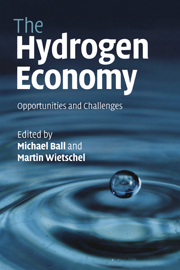Book contents
- Frontmatter
- Contents
- List of main contributors
- Preface
- Acknowledgements
- List of abbreviations
- 1 Scope of the book
- 2 Why hydrogen?
- 3 Non-renewable energy resources: fossil fuels – supply and future availability
- 4 Non-renewable energy resources: nuclear fuels
- 5 Assessment of the potentials for renewable energy sources
- 6 Carbon capture and storage
- 7 Energy-chain analysis of hydrogen and its competing alternative fuels for transport
- 8 Hydrogen today
- 9 Fundamental properties of hydrogen
- 10 Hydrogen production
- 11 Hydrogen storage
- 12 Hydrogen distribution
- 13 Key role of fuel cells
- 14 Hydrogen-infrastructure build-up in Europe
- 15 Building a hydrogen infrastructure in the USA
- 16 Hydrogen and the electricity sector
- 17 Hydrogen corridors
- 18 Macroeconomic impacts of hydrogen
- 19 Sustainable transport visions: the role of hydrogen and fuel-cell vehicle technologies
- 20 Energy-efficient solutions needed – paving the way for hydrogen
- 21 The future of hydrogen – opportunities and challenges
- Further reading
- Index
Preface
Published online by Cambridge University Press: 22 January 2010
- Frontmatter
- Contents
- List of main contributors
- Preface
- Acknowledgements
- List of abbreviations
- 1 Scope of the book
- 2 Why hydrogen?
- 3 Non-renewable energy resources: fossil fuels – supply and future availability
- 4 Non-renewable energy resources: nuclear fuels
- 5 Assessment of the potentials for renewable energy sources
- 6 Carbon capture and storage
- 7 Energy-chain analysis of hydrogen and its competing alternative fuels for transport
- 8 Hydrogen today
- 9 Fundamental properties of hydrogen
- 10 Hydrogen production
- 11 Hydrogen storage
- 12 Hydrogen distribution
- 13 Key role of fuel cells
- 14 Hydrogen-infrastructure build-up in Europe
- 15 Building a hydrogen infrastructure in the USA
- 16 Hydrogen and the electricity sector
- 17 Hydrogen corridors
- 18 Macroeconomic impacts of hydrogen
- 19 Sustainable transport visions: the role of hydrogen and fuel-cell vehicle technologies
- 20 Energy-efficient solutions needed – paving the way for hydrogen
- 21 The future of hydrogen – opportunities and challenges
- Further reading
- Index
Summary
The world is facing a severe energy and environmental challenge – how to provide competitive and clean energy for its citizens in light of an escalating global energy demand, concerns over energy supply security, climate change and local air pollution. More specifically, with soaring crude oil prices and with conventional oil becoming harder to find and produce, and its production eventually declining, there is a growing imperative to develop alternative fuels. At the same time, governments are stepping up their efforts to address the challenges of sustainable mobility and to foster the expansion of low-carbon fuels. Against this backdrop, this book centres around the question on how the growing energy demand for transport services can be met in the long term, while adhering to the aforementioned external framework conditions.
While the road-transport sector is expected to witness a much broader portfolio of fuels in the future, the context for considering alternative fuels is dynamic and uncertain. However, there is a growing consensus that electric mobility (i.e., whereby the vehicle drive is provided by an electric motor) is going to play a significant role in transforming the transport sector and could experience a substantial uptake in the future. Under such a scenario, hydrogen-powered vehicles could capture a noticeable market share. Hydrogen is particularly promising as it has the potential to address simultaneously all the major energy policy objectives in the transport sector, i.e., greenhouse-gas emissions reduction, energy security and reduction of local air pollution.
- Type
- Chapter
- Information
- The Hydrogen EconomyOpportunities and Challenges, pp. xv - xviPublisher: Cambridge University PressPrint publication year: 2009



